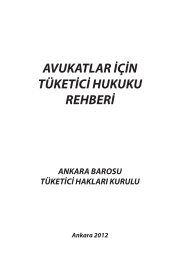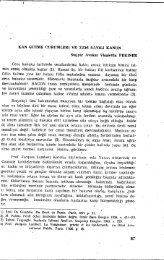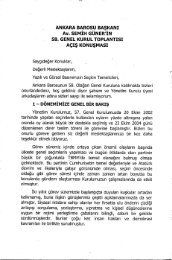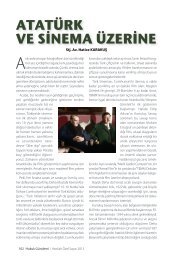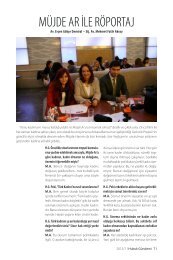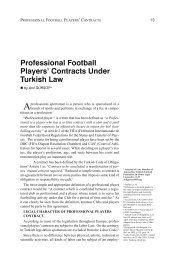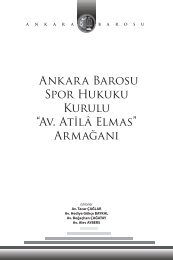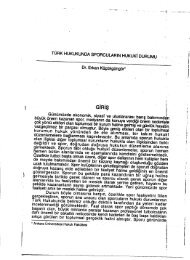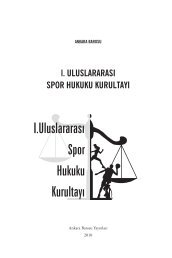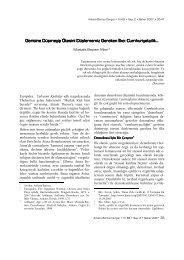The Turkish Cypriot Legal System from a Historical ... - Ankara Barosu
The Turkish Cypriot Legal System from a Historical ... - Ankara Barosu
The Turkish Cypriot Legal System from a Historical ... - Ankara Barosu
You also want an ePaper? Increase the reach of your titles
YUMPU automatically turns print PDFs into web optimized ePapers that Google loves.
<strong>The</strong> TuRkish CypRioT legal sysTem fRom a hisToRiCal peRspeCTiVe<br />
British era, and family law and personal law disputes of the Muslims<br />
and non-Muslims have been held in different courts. Moreover, there<br />
is no Civil Code in the <strong>Cypriot</strong> legal system. Family law issues such as<br />
engagement, matrimony, divorce, custody, guardianship, descent, alimony,<br />
law of property, etc. are regulated under a private code, “Family<br />
Code.” Thus Family Courts, each existing of one judge, apply to this<br />
code when resolving disputes in these matters. 96<br />
C) High Court<br />
Pursuant to the Constitution of the TRNC (Art. 143), the High Court<br />
consisting of a president and seven members, is the highest court in the<br />
country. Like other courts, the organization chart of the High Court is<br />
also transferred <strong>from</strong> the British era to the RoC and then to the Federated<br />
State and to TRNC. An interesting point of this chart is that the<br />
High Court acts as the Constitutional Court, as the Supreme Court, as<br />
the High Court of Appeals and also as the High Administrative Court<br />
(Art. 143,2). In other words, there is not more than one higher court<br />
in the TRNC legal system as there are in the Republic of Turkey. One<br />
High Court performs the duties of other high courts.<br />
a) High Court acting as the “Constitutional Court”<br />
<strong>The</strong> high court, when acting as the Constitutional Court, consists of<br />
the president of the Court and four High Court judges. Trial process is<br />
not performed only on file but through hearings. <strong>The</strong> High Court has<br />
the following rights and duties as the Constitutional Court: 97<br />
a. 1 To solve power and authority disputes upon the objection by the<br />
President, the Assembly of the Republic or another body of the<br />
State,<br />
a. 2 To give their opinion to the President, if the President suggests<br />
that the whole or some rules of a law adopted by the Assembly of<br />
the Republic is contrary to the Constitution,<br />
a. 3 To render final decisions on the annulment cases brought before<br />
them by the President, political parties represented in the Assembly<br />
of the Republic, political groups, at least 9 deputies or institutions,<br />
entities and unions, in matters related to their existence and<br />
duties, claiming the contradiction with the constitution of a law,<br />
decree, by-law or a decision of the Assembly of the Republic or<br />
a regulation,<br />
a. 4 To render final decisions when a code, a decision or a code, which<br />
may effect a step of the judicial procedure including the appeal<br />
phase, is brought before them by a court claiming contradiction<br />
with the Constitution,<br />
a. 5 To construe the articles of the Constitution if requested,<br />
96 NECATİGİL, Anayasa ve Yönetim Hukuku, p. 11.<br />
97 DAYIOĞLU, pp. 67-69 ; NECATİGİL, Anayasa ve Yönetim Hukuku, p. 5.<br />
115



